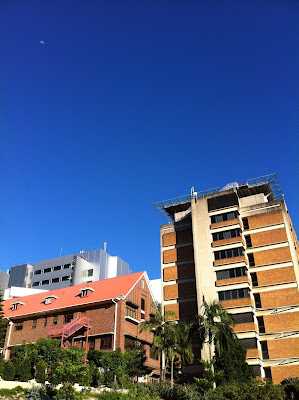ところで、どちらの英語試験を選択すればいいのでしょう?IELTSなのか、それともOETなのか?私の個人的な印象ですが、IELTSではライティングがとても難しいと感じています。一時間の中で、二つのエッセイを書き上げなければならない構成になっていて、時間がほんとに足りません。さらに、文字数を合わせなければならない、内容も良くなければならない、よく組織された枠組みで議論を展開しなければならない、などの要素が要求されます。これらをある程度完璧に果たして初めてライティング7.0に到達できるといえると思います。これは非常に難解なレベルです。ライティングが苦手という人には、IELTSはお奨めできないと言えます。一方、医療者にとって医学英語を中心とした英語試験のOETのほうがとっつきやすいという印象はある意味当たってはいると思います。またOETでは、ライティングが簡単です。OETのライティングは、患者の紹介状を一通書くことになっていて、これは何回か練習すれば、それなりのものが書けるようになるという点で、IELTSのライティングと比較するとかなり簡単と言っていいと思います。ただし、OETでは、リスニングが比較的難しいと言えます。リスニングの試験内容は、私が受験した2009年8月当時は二部で構成されていました。前半は医者と患者のやりとりの会話を聞きわけ設問に答えるという形式、後半はあるテーマについての講義を聞きその設問に答えるという形式で構成されていました。IELTSのリスニングのようにピンポイントで答えなければいけない設問ではなくて、聞き取れたことを何でもいいから書き出していってその中で正解があれば点に結び付くという、どこに集中していいのか分かりにくいという側面を持つ設問が多いこともあり、そのために聞き洩らしが多くなる、などの難しい要素が、OETのリスニングテストにはあります。リーディングとスピーキングはどちらも同じような難易度だと思います。要約すると、結局はケースバイケースだと思いますが、ライティングに自信があればIELTS、リスニングに自信があればOETを選んで合格を目指す、という風に考えていくべきだと思います。
Now, I will write about the English exam. Not only us Japanese doctors, but also all non-English-as-a-first-language overseas doctors who try to register to the Australian Medical Board must pass it. And it might be no exaggeration to say that this English exam is the highest hurdle for Japanese doctors to overcome in the process of the registration. For Japanese doctors, there are two types of English tests, IELTS or OET, and you just need to pass either one. IELTS is a test with academic English content, whereas OET is a health related English test for doctors, dentists, nurses, pharmacists, physiotherapists, etc.
By the way, which English test should be chosen? IELTS or OET? My personal impression towards IELTS is that the Writing module of it is extremely difficult. Within one hour, you need to write two essays. Time is too short. Furthermore, you need to write with required number of words, meaningful content, well organised structure, etc. Only if you write fairly perfect in the factors, you can finally reach to the score of 7.0. This is very high level. Therefore, it is fair to say that if you are not good at writing, IELTS won't be recommended to try. On the other hand, OET which is a medically or health oriented English test is much more accessible to health-related professionals. What is more is that OET's Writing module is easy. It requires that you just need to write a referral letter on one patient. This is no doubt far easier than the IELTS Writing module in that anyone can practice that format and reach to a certain level definitely. However, one thing is that OET's Listening module is relatively difficult. When I sat the exam in August 2009, it consists of two parts. The first half is about listening to a patient-and-doctor consultation scenario and finding answers from it. The latter half is about listening to a lecture of medically or health related theme and again finding answers from it. Unlike the IELTS Listening module where you need to listen up a pinpoint word in the flow, OET's Listening is more like scribbling down words or phrases whatever seem relevant from what you can catch. This feature gives difficulty in which point you need to concentrate and leads you to miss catching answers. I think, level of Reading and Speaking modules between IELTS and OET is pretty much similar. To wrap up, although ultimately it is case-by-case, it might be wise to think that if you are confident in writing, try IELTS and if you are confident in listening, try OET.




